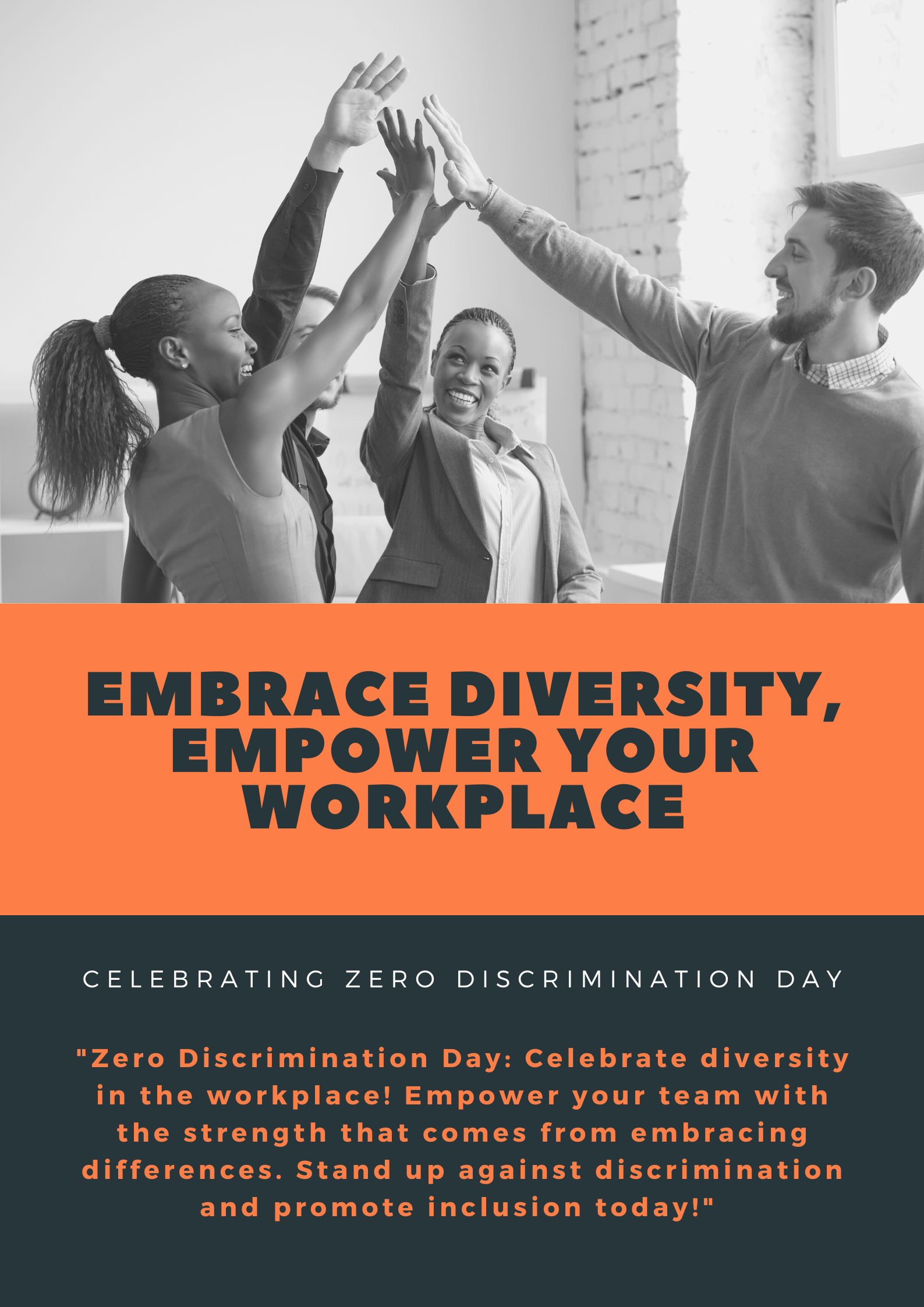Tags:


Zero Discrimination Day is an annual event held on March 1st to promote equality and eradicate all forms of discrimination (UNAIDS, 2022). Discrimination violates human rights and leads to inequality, exclusion, and marginalization. This blog article emphasizes the significance of Zero Discrimination Day and how it provides an opportunity to embrace diversity in the workplace.
Zero Discrimination Day is an international observance that raises awareness about the negative impact of discrimination and promotes diversity and inclusion. Introduced by the United Nations in 2014, this year’s theme is “Save lives: Decriminalize,” focusing on how decriminalizing key populations and people living with HIV aids in ending the AIDS pandemic.
Zero Discrimination Day is crucial as it sheds light on the adverse effects of discrimination on individuals, communities, and society as a whole. Discrimination erects barriers that hinder access to opportunities, services, and resources necessary for thriving. It also results in social exclusion and marginalization, negatively impacting mental and physical health.
Zero Discrimination Day provides an excellent platform to emphasize the importance of diversity and inclusion in the workplace. A diverse workforce, comprising individuals from various backgrounds, cultures, and experiences, fosters creativity, innovation, and a broader problem-solving perspective. However, to prevent discrimination and exclusion, it is crucial to support diversity with inclusive policies and practices (Diversity Best Practices, 2022).
Promoting diversity is essential for cultivating an inclusive and innovative work environment. Employees with different backgrounds and experiences bring unique perspectives and ideas, leading to novel solutions, enhanced creativity, and better decision-making.
For instance, in Sri Lanka, Sampath Bank, a leading commercial bank, recognizes diversity as a key driver for innovation and creativity. The bank’s “Sampath Diriya” program offers training and resources to empower women in starting and growing their own businesses. Consequently, the bank has tapped into new markets and created innovative solutions tailored to its diverse customer base (Sampath Bank, 2022).
Promoting diversity in the workplace is a catalyst for innovation. By bringing together individuals with different backgrounds and experiences, fresh ideas and solutions emerge, resulting in improved products, increased market share, and higher profits.
The Sri Lankan apparel industry exemplifies the success of diversity-driven innovation. MAS Holdings, a leading apparel manufacturer, has implemented initiatives to promote diversity and inclusion, particularly focusing on gender equality and women’s empowerment. As a result, the company has developed innovative products that cater to diverse markets (MAS Holdings, 2022).
Promoting diversity in the workplace also leads to diverse leadership, wherein individuals from varied backgrounds and experiences have equal opportunities for career advancement. This inclusivity fosters better decision-making, heightened employee engagement, and improved organizational performance (Cox & Blake, 1991).
Dialog Axiata, one of Sri Lanka’s largest telecommunications providers, recognizes the importance of diversity in leadership. The company has implemented initiatives that promote diversity and inclusion, with a particular focus on gender equality and empowering women (Dialog Axiata, 2021). Consequently, the organization has seen improved performance, with its leadership team reflecting the diversity of its employees.
Research indicates that promoting diversity in the workplace yields various positive outcomes, including financial benefits. Companies with diverse workforces are more likely to achieve above-average financial returns (Herring, 2009). This stems from diversity fostering innovation, improving decision-making, and increasing employee engagement.
For instance, in Sri Lanka, the John Keells Group, one of the largest conglomerates, recognizes the financial advantages of promoting diversity. Through initiatives focusing on gender equality and women’s empowerment, the company has witnessed improved financial performance and successfully attracted and retained top talent (John Keells Group, 2021).
In conclusion, Zero Discrimination Day serves as a significant reminder to promote diversity in the workplace. By fostering an inclusive and diverse environment, employers can harness the benefits of increased innovation and financial success while ensuring equal opportunities for all employees. It is essential to acknowledge that promoting diversity is an ongoing process requiring sustained effort and commitment from all individuals involved (UNAIDS, 2021). While celebrating events like Zero Discrimination Day is vital, implementing year-round policies and practices that support diversity and inclusion remains equally important.
Tharushi Imasha Kumarasiri
Mar 16, 2023
0